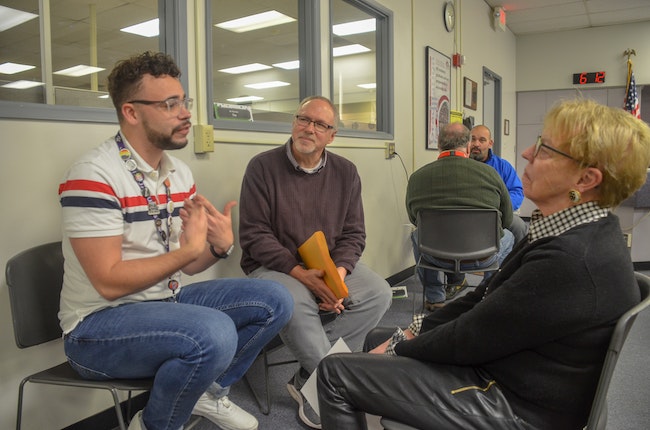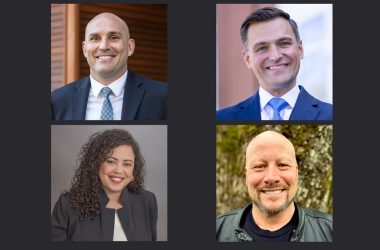 Dean Wright, left, a Judson Middle School social studies teacher, and Pete Teller, a Leslie Middle School counselor, talk to school board director Kathy Goss at a Dec. 17, 2019 work session on equity (Rachel Alexander/Salem Reporter)
Dean Wright, left, a Judson Middle School social studies teacher, and Pete Teller, a Leslie Middle School counselor, talk to school board director Kathy Goss at a Dec. 17, 2019 work session on equity (Rachel Alexander/Salem Reporter)
Dean Wright sat in a chair against the wall of the Salem-Keizer School District board room as each of the seven elected leaders of the district took turns speaking to him.
Wright, a 7th grade social studies teacher at Judson Middle School, was at an evening board session to explain his experiences as a gay teacher in the district, and the challenges LGBTQ students face. When he started teaching three years ago, he told them, he didn’t share his orientation.
“I was terrified if I told anyone I was going to lose my job,” he explained.
The conversation came during a school board meeting to consider how the board can better serve students by being aware of experiences different from their own.
Board members rotated one-on-one between district employees who spoke about the problems they see in local schools as black, Latino, gay and Pacific Islander educators, and educators who work with students with disabilities and those learning English.
Some spoke about being on the receiving end of racist remarks or hearing them directed at students. Others discussed ways the current school system doesn’t serve all students well.
[ Help build Salem Reporter and local news – SUBSCRIBE ]
Each board member spent seven minutes sitting face-to-face with a pair of district employees who shared their experiences.
Many board members teared up as they listened to stories or shared what they’d learned as a group following the conversations and said they want to find more ways to build feedback from community groups into their work in ways that don’t require people to come testify at a meeting.
“If we were to reach equity, there’s a lot of healing that needs to be done. A lot of mutual trust that needs to be rebuilt,” said board member Satya Chandragiri, who represents south Salem.
 School board member Satya Chandragiri listens as Rita Glass, president of Salem-Keizer’s classified employees union, and Carlos Ruiz, an assistant principal at North Salem High School, share their experiences as Latino educators at a Dec. 17, 2019 work session on equity(Rachel Alexander/Salem Reporter)
School board member Satya Chandragiri listens as Rita Glass, president of Salem-Keizer’s classified employees union, and Carlos Ruiz, an assistant principal at North Salem High School, share their experiences as Latino educators at a Dec. 17, 2019 work session on equity(Rachel Alexander/Salem Reporter)
Board member Danielle Bethell said it was disheartening to hear that the concerns LGBTQ students have, which include being bullied in locker rooms, haven’t changed much since she was a student.
“The examples that were provided to me were examples from when I was in middle school,” she said.
She was also frustrated by the difficulty students with disabilities have receiving accommodations that will help them learn.
Board chair Marty Heyen said it was heartbreaking to hear the number of racist experiences students and staff still endure in local schools. Afterward, she teared up saying she’d thought about how far society still is from realizing Martin Luther King Jr.’s dream.
“We still haven’t reached that dream. That stuff shouldn’t still be happening,” she said.
Vice chair Jesse Lippold spoke about his experience growing up as a member of the Confederated Tribes of the Grand Ronde who looks white. He said he wanted to believe skin color and race didn’t matter, but seeing the way family members who looked more indigenous were treated showed him that wasn’t the case.
“Our kids are living in these realities,” he said. “It’s hard to realize the lack of representation or diversity that our students experience.”
 School board vice chair Jesse Lippold at a Dec. 17, 2019 work session on equity (Rachel Alexander/Salem Reporter)
School board vice chair Jesse Lippold at a Dec. 17, 2019 work session on equity (Rachel Alexander/Salem Reporter)
Paul Kyllo, the longest-serving member of the current board, said he it was “maddening” to hear educators talking about the same problems with discrimination he’s heard since the 1990s.
“They’re still talking about it. Everything is just not moving very fast,” he said.
Other board members participating were Sheronne Blasi and Kathy Goss, who said they found the conversations helpful.
Wright said each board member was responsive to what he shared, and upset to learn some students avoid using school bathrooms or changing after gym to avoid being bullied for their sexual orientation or gender identity.
“They really were listeners,” he said.
After remarks by Superintendent Christy Perry and other administrators, the superintendent asked board members to think about their own identities and experiences, and how those shaped their perspectives.
She gave examples from her own life, including how she struggled with what to do after the 2016 presidential election when many students and families were afraid to come to school because of stepped up federal immigration enforcement and anti-immigrant rhetoric.
Perry didn’t feel she could weigh in. Her role as superintendent wasn’t to tell anyone what to believe politically or share her personal feelings on an election.
She held that position until she talked to community leaders who told her silence was hurting families. Eventually, she did reassure Latino and immigrant students they were welcome at school through a statement and new policy.
“I didn’t lead well. I didn’t stop long enough to have conversations,” Perry said Tuesday. “It just like was this cascading moment that I as a white leader had no idea.”
After Perry spoke, each board member listed their gender, race, sexual orientation, gender identity, native language and whether they have a disability.
 School board members filled out forms listing their gender, race, sexuality and more as part of a Dec. 17, 2019 work session on equity (Rachel Alexander/Salem Reporter)
School board members filled out forms listing their gender, race, sexuality and more as part of a Dec. 17, 2019 work session on equity (Rachel Alexander/Salem Reporter)
Then, they began the conversations.
Cynthia Richardson, the district’s director of equity, access and advancement, said the format was designed to help board members better understand the experience of people different from them in Salem-Keizer schools.
“If you haven’t experienced it, if you have no knowledge of it, if you haven’t lived it you have to find ways to become familiar with it,” she said.
The session followed months of discussion in the boardroom and outside about how Salem-Keizer leaders and the school board consider equity in their decision making.
By policy, the board and district administrators are supposed to consider the effect of decisions on historically marginalized groups and work to improve their performance, rather than simply treating all students the same.
Latino community groups, especially Latinos Unidos Siempre, a youth advocacy group, have spoken regularly at board meetings about how the district needs to better follow its own policies on equity by, for example, addressing the fact that black and Latino students are much more likely to be suspended or expelled than their white peers.
At a board meeting last week, North Salem High School student Ramon France shared how he’d gotten in trouble in a math class because he was trying to translate an assignment for a classmate who didn’t speak English well.
“Your policy says one thing. Students like me aren’t receiving justice or equity,” he said. He was part of a group of nearly a dozen current and former students the group organized to speak about their experiences.
 Students organized by Latinos Unidos Siempre urged the new Salem-Keizer School Board to address the mental health needs of immigrant students and stop policies that disproportionately punish students of color at a July 2019 meeting. (Rachel Alexander/Salem Reporter)
Students organized by Latinos Unidos Siempre urged the new Salem-Keizer School Board to address the mental health needs of immigrant students and stop policies that disproportionately punish students of color at a July 2019 meeting. (Rachel Alexander/Salem Reporter)
In an October work session, some school board members talked about simplifying the existing equity policy so it’s easier for community members to understand.
Heyen said that discussion led to concerns from some community members the board might weaken the equity lens, which isn’t their intent. They set up the Tuesday night session to help newer board members understand the existing policy and get context to help them consider revisions.
They may look at revising the policy in 2020, she said, and will seek input from community groups, she said.
“It’s not something we’re going to do in a vacuum,” she said.
In a letter to the board, Javier Quiroz, who works at the Salem-Keizer Coalition for Equality said the group wants the policy changed with help from communities of color. The Coalition works with Latino parents.
“It was a good start several yeas ago in learning what equity means and what it looks like. However, it does need to be stronger with goals and expectations for the entire district and in each school,” Quiroz wrote.
Reporter Rachel Alexander: [email protected] or 503-575-1241.

Rachel Alexander is Salem Reporter’s managing editor. She joined Salem Reporter when it was founded in 2018 and covers city news, education, nonprofits and a little bit of everything else. She’s been a journalist in Oregon and Washington for a decade. Outside of work, she’s a skater and board member with Salem’s Cherry City Roller Derby and can often be found with her nose buried in a book.









